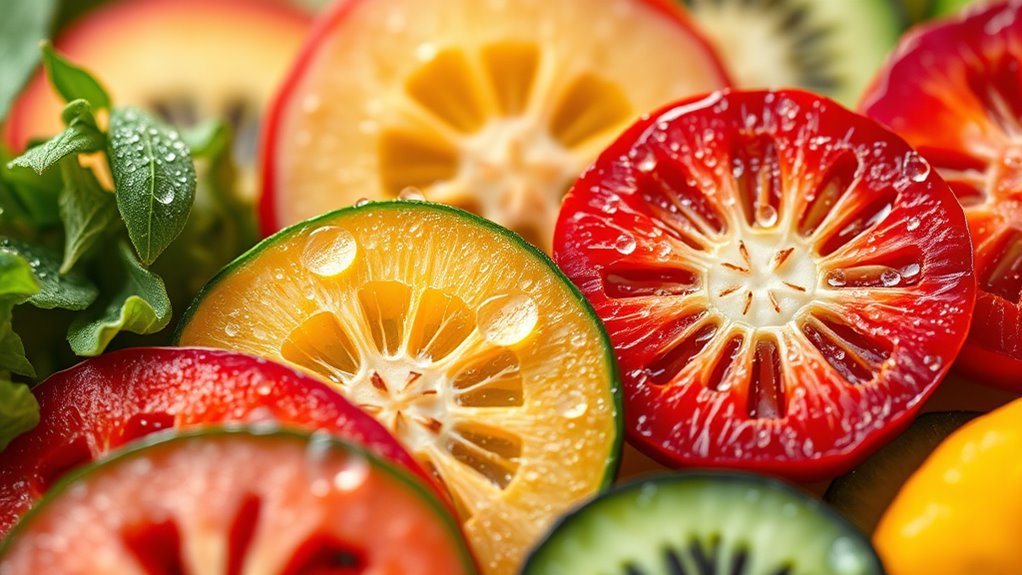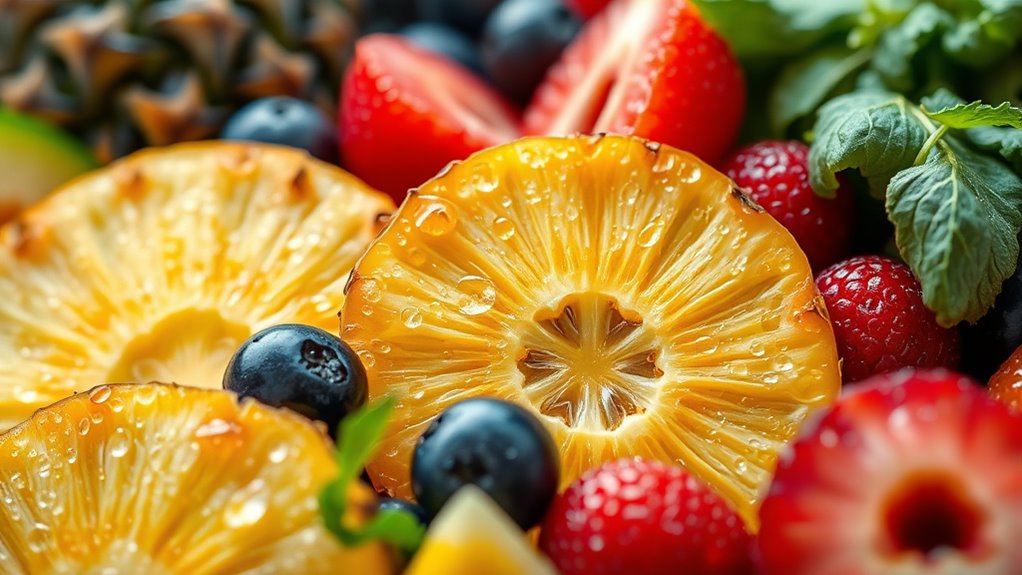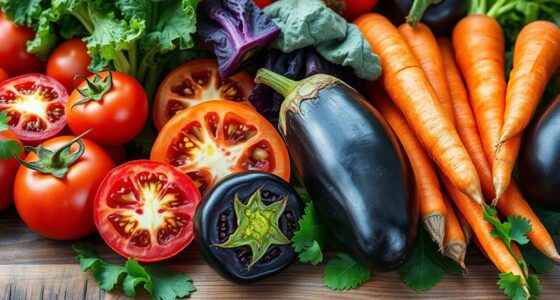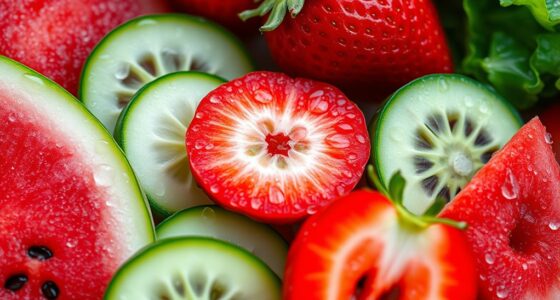Enzymes are powerful molecules in raw foods that help your body break down nutrients more easily, supporting better digestion and overall health. They act as natural catalysts, speeding up chemical reactions your body needs to stay healthy. Foods like fruits, vegetables, honey, and fermented products contain active enzymes that work without cooking destroying them. Incorporating these raw foods can reduce your digestive load and boost nutrient absorption. Keep exploring to uncover more about these hidden health secrets.
Key Takeaways
- Enzymes are biological catalysts that accelerate vital chemical reactions in the body, essential for digestion and overall health.
- Raw foods contain active enzymes like bromelain and papain, which aid in breaking down food molecules during digestion.
- Consuming raw foods helps preserve these enzymes, reducing the workload on the body’s own enzyme production.
- Enzymes are highly specific, targeting particular substrates to improve digestion of fats, proteins, and carbohydrates.
- Supporting enzyme intake through raw foods boosts immune function, energy production, and cellular repair processes.

Have you ever wondered how your body carries out countless chemical reactions every second? It’s thanks to tiny but powerful molecules called enzymes. These biological catalysts speed up essential processes, from digesting your food to repairing tissues. Enzyme function is critical because, without them, these reactions would occur too slowly to sustain life. They work by lowering the activation energy needed for reactions to proceed, making everything happen more efficiently. When you eat raw foods, you’re not just consuming nutrients—you’re also getting access to natural enzymes that can support your digestion and overall health.
Enzyme sources are abundant in raw foods, especially fruits and vegetables. These foods contain enzymes that are active and ready to assist your body in breaking down food molecules. For example, pineapples contain bromelain, which helps digest proteins, and papayas have papain, another enzyme that targets protein breakdown. Raw honey and fermented foods like sauerkraut or kimchi are also rich in enzymes that aid digestion. When you consume these foods, you’re introducing enzyme sources directly into your system, potentially reducing the workload on your body’s own enzyme production. This can be especially helpful if your body’s enzyme activity diminishes with age or certain health conditions.
It’s important to understand that enzymes are highly specific. Each enzyme has a particular shape that fits only certain substrates—molecules it acts upon. This specificity means that eating raw foods rich in enzyme sources can assist with specific digestion needs, such as breaking down fats, proteins, or carbohydrates. Cooking foods often destroys these sensitive enzymes, which is why many health enthusiasts advocate for eating more raw or minimally processed foods. By doing so, you preserve the natural enzyme function, supporting your digestive system and possibly improving nutrient absorption.
Moreover, the enzyme function isn’t limited just to digestion. Enzymes play roles in immune responses, energy production, and cellular repair. When you incorporate enzyme sources from raw foods into your diet, you’re providing your body with a natural boost that can promote better overall health. Additionally, the presence of active enzymes in raw foods can help maintain enzyme activity in your digestive tract, especially when your body’s own enzyme production is compromised. While your body can produce its own enzymes, helping out with external sources can ease the burden, especially during times of stress or illness. So, by choosing raw fruits, vegetables, and other enzyme-rich foods, you’re actively supporting your body’s complex and essential biochemical processes, keeping your metabolism running smoothly and efficiently every day.
Frequently Asked Questions
Can Enzyme Levels Vary Between Different Raw Foods?
Yes, enzyme levels can vary between different raw foods due to enzyme variability and raw food diversity. You’ll find that some fruits and vegetables naturally contain higher enzyme concentrations, aiding digestion, while others have fewer enzymes. This variation depends on factors like ripeness and how the food is grown. By including a diverse range of raw foods in your diet, you can maximize your intake of beneficial enzymes.
How Do Cooking Methods Affect Enzyme Activity?
Imagine your food’s enzymes are delicate dancers, easily thrown off balance by heat. Cooking methods that involve high heat cause heat denaturation, destroying enzyme activity and preventing enzyme preservation. Steaming or light sautéing might retain more enzymes than boiling or frying. You’ll want to choose gentle cooking techniques to preserve enzymes, ensuring you get the maximum nutritional benefit from your foods, rather than surrendering them to heat’s destructive power.
Are Enzyme Supplements Necessary for a Balanced Diet?
You might wonder if enzyme supplements are necessary for a balanced diet. The truth is, enzyme supplement myths often suggest you need extra enzymes, but your body can produce enough from natural dietary enzyme sources like raw fruits and vegetables. Most people don’t need supplements unless advised by a healthcare professional. Focus on a varied diet rich in enzyme-rich foods to support digestion naturally and avoid unnecessary supplement use.
Do Enzymes Have Any Health Risks or Side Effects?
You might wonder if enzymes cause health risks or side effects. Generally, enzyme supplements are safe when used properly, but enzyme overload can lead to digestive issues like stomach pain or diarrhea. Some people may experience allergic reactions, such as itching or swelling. Always follow dosage instructions and consult your healthcare provider, especially if you have allergies or underlying health conditions, to avoid potential risks.
How Long Do Enzymes Remain Active in Stored Raw Foods?
Did you know enzymes in raw foods typically stay active for just a few hours to a couple of days? Enzyme degradation depends heavily on storage conditions—cool, dark environments slow down this process, while warmth and exposure to air speed it up. If you want to preserve enzyme activity, keep raw foods refrigerated and sealed. Otherwise, the enzymes will lose their potency quickly, reducing their health benefits over time.
Conclusion
Now that you know the scoop on enzymes, you see how they’re the secret nutrients that keep your body running smoothly. Eating raw foods helps preserve these essential enzymes, giving your digestion a boost and supporting overall health. Remember, don’t put all your eggs in one basket—variety is key. By including enzyme-rich foods in your diet, you’re on the right track to feeling your best. Keep it simple and let nature do the heavy lifting.










